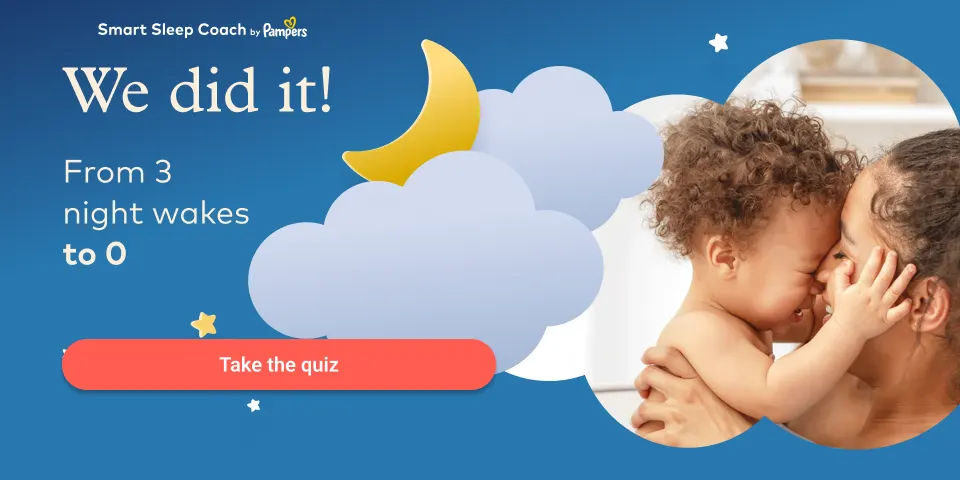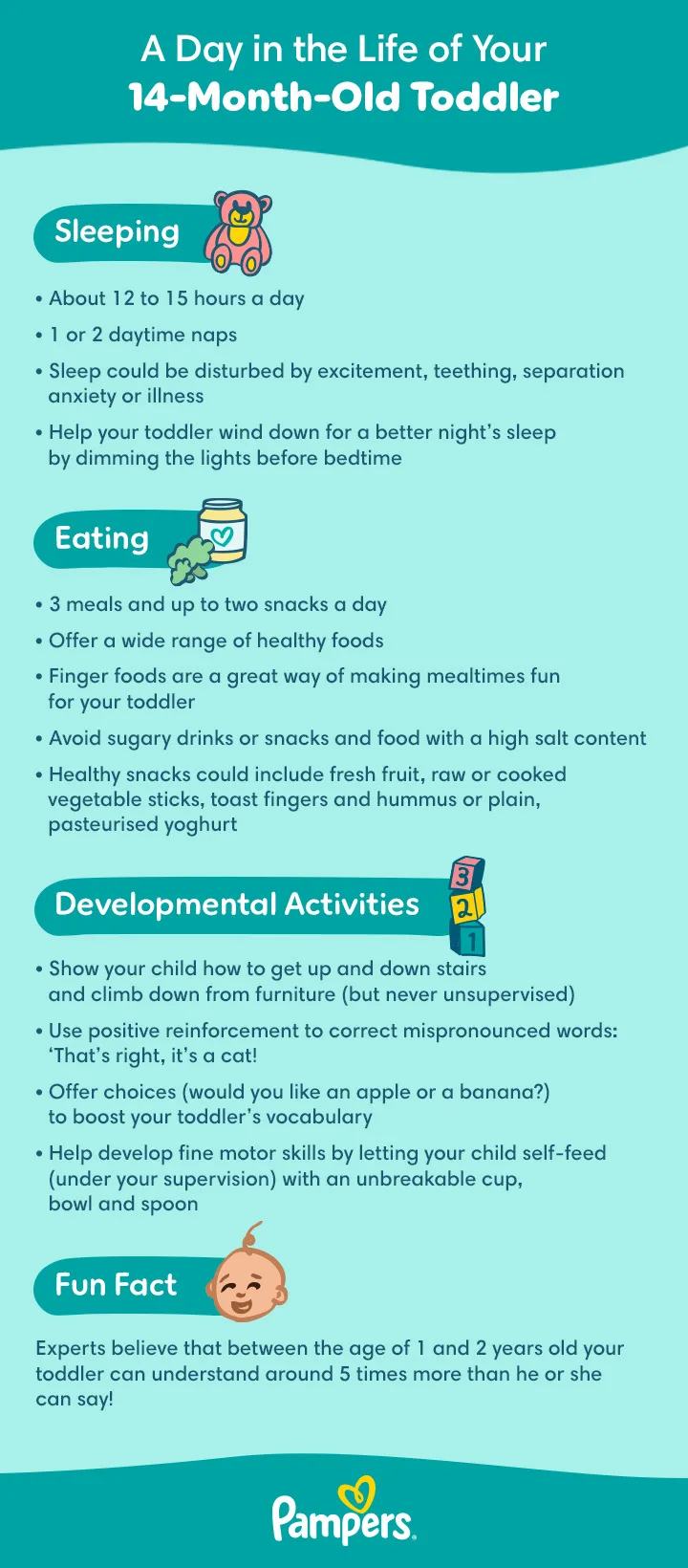14-Month-Old: What a Personality!
Your toddler’s personality is really starting to shine through. Your toddler may or may not have started talking at 14 months old, but almost certainly understands more and more of what you say. With so many new development milestones being reached and activities to enjoy, life is anything but dull with a toddler in the house. Let’s dive right in.
Toddler Development Milestones
If you have an older child or know other parents of young children, you may have noticed the differences between children when it comes to reaching the various development milestones.
This is normal and expected – every child is special and unique – so don’t worry if your toddler reaches some of the stages below sooner or later than you’d expected. If you are ever concerned about your toddler’s development, speak to your health visitor or doctor.
As a general guideline, these are some of the milestones your toddler might reach at around 14 months old:
Growth and Physical Development: Slower growth
The rapid growth of the first year usually peaks at around 6 to 9 months. Now, as your 14-month-old toddler becomes more active, less energy is being used for growth and more for playing and exploring.
On average, your little one may put on around 2 to 3 kilograms over the year ahead, but growth rates can vary over time and from one child to the next. Your health visitor will be tracking your child’s growth and using weight and growth charts.
Movement: Toddling and Messy Mealtimes
If your 14-month-old is walking, this may look quite different from the way older children or adults walk. At this stage, toddlers step with a wide gait, toes pointed outward and the steps can be shaky. It all looks very tentative and slow right now — particularly when your toddler loses balance and falls – but it won’t be long before you’ll be running to catch up with your budding Olympic sprinter.
And if your 14-month-old is not walking yet, don’t worry. It’s impossible to say exactly when your child will take those first tentative steps, but this development milestone will likely be reached in the next few weeks or months if it hasn’t happened already.
Self-feeding
Your little gourmet might be getting better at eating with a spoon or fingers and drinking from a cup, although you may still need to lend a hand. Some of the food may not make it into your toddler’s mouth, but it takes time and lots of practice (and mess) for your toddler to learn the fine motor skills needed for handling cutlery – your little one will get there in the end!
Cognitive Development: Language Comprehension
Around this time, your child may point to a favourite toy or teddy when you ask where it is. Or you might notice that your toddler goes over to the kitchen table or highchair when you say it’s time for lunch. This is because – even if your 14-month-old is not talking yet – he or she is understanding more and more of what you say.
You can help boost your child’s comprehension skills and vocabulary by naming the objects around you both and talking about whatever is going on around you. Take every opportunity to do this whether it’s during mealtimes and nappy changes, or during playtime or strolls in the park. You can even narrate your day as you go about doing chores with your little one by your side.
Around now, your toddler will probably learn to say two or three clear words like ‘mama’ or the name of something familiar like ‘drink’ or ‘book’. You may also find that your budding raconteur misses the ends off words (for example saying ‘doh’ instead of ‘dog’) or even whole syllables (so, for instance, ‘potato’ might be ‘tay-toe’).
Equally, it’s not unusual if your toddler is not talking just yet at 14 months old – some children reach this milestone later than others.
How to Support Your 14-Month-Old’s Development
These are just some of the things you can do to support your 14-month-old’s development:
Help your child navigate obstacles. Show your toddler how to climb down from furniture like sofas and beds and get up and down stairs. Besides boosting your little explorer’s independence, this is also great for helping him or her develop balance and coordination. Never let your 14-month-old use the stairs unsupervised at this stage – always keep them blocked with a baby gate as part of child proofing your home.
Help your toddler learn words with positive reinforcement. Your 14-month-old already understands a lot of words, and if he or she hasn’t yet started talking you probably won’t have long to wait for those first simple words. If your toddler does try to say a word and is having trouble or gets it wrong, it’s OK to correct the mistake – as long as you do it in a positive way. Don’t criticise or scold your child. Instead, say something encouraging like ‘Yes, that’s right – it’s a dog!’
Offer choices to boost vocabulary. One way of helping your 14-month-old learn more words is to offer alternatives whenever you can. For example, at teatime: ‘would you like a peach or a banana?’
Mealtimes for Your 14-Month-Old Toddler
Your 14-month-old toddler needs about three small meals and one or two healthy snacks a day to stay well-nourished and energised.
Offer your child nutritious selections from the main food groups:
Starchy foods like potatoes, bread and rice
Fruit and vegetables
350 millilitres of whole milk or 2 servings of dairy products (like yoghurt or cheese) or dairy alternatives (such as unsweetened, calcium-fortified soya, oat or almond drinks)
Protein – either from animal sources like meat, eggs and fish, or alternatives like beans, chickpeas and lentils.
Finger Food for Your 14-Month-Old
Finger foods make great snacks to keep your little one going between mealtimes. Besides being fun, picking up and lifting the tasty morsels of food from plate to mouth also helps develop your toddler’s fine motor skills.
Healthy snack ideas for your 14-month-old:
Bite-sized pieces of fresh fruit like banana, apple, soft ripe pear or peach
Carrot or cucumber sticks
Rice or corn cakes (unsweetened, unsalted)
Toast, pita or chapati fingers
Pasteurised plain full-fat yoghurt or hummus for dipping.
Does Your 14-Month-Old Need Extra Vitamins?
Although a varied diet of healthy foods usually provides enough of most vitamins and minerals, experts recommend also giving your toddler a daily supplement of vitamins A, C and D between 6 months and 5 years of age.
Besides these, your toddler may also need extra vitamin B12 if your family follows a vegetarian diet.
Ask your health visitor or doctor whether your child could benefit from these or any other vitamin supplements.
How Much Sleep Does a 14-Month-Old Toddler Need?
Your 14-month-old needs around 12 to 15 hours of sleep a day, including 1 or 2 daytime naps. At times you may experience periods of sleep regression, when your little one suddenly finds it harder to fall or stay asleep than before.
These are some of the reasons things that can affect your toddler’s sleep patterns at 14 months old and beyond:
Excitement about learning new skills. Sometimes disruptions to your 14-month-old’s sleep schedule may be caused by the thrill of learning a new skill. For example, if your toddler has recently started walking, he or she might have a hard time winding down at naptime or bedtime. As your child gets used to the newfound skill, this kind of excitement will fade giving way to easier bedtimes again.
Artificial light. Electric light can stimulate your child’s brain activity, reducing production of the sleep hormone melatonin. Try dimming the lights at the beginning of your toddler’s bedtime routine.
Separation anxiety. If your 14-month-old toddler cries or has little tantrums after waking in the night to find you’re not there, this may just be separation anxiety, which is a normal part of your toddler’s development. Try comforting your toddler without making eye contact, engaging in play or doing anything else that might wake him or her up even more.
Feeding. If you’re still breastfeeding, your toddler may wake up in the night sometimes for a feed. This is normal, and it’s OK to keep breastfeeding (alongside your little one’s regular diet of solid food and ‘big kid’ drinks like water or whole milk) for as long as it suits you and your child.
Illnesses. Common ailments like coughs, colds and flu can disturb your toddler’s sleep. If your child has a fever (a high temperature of 38° Celsius or more) bringing your child’s temperature down with the medicine recommended by your doctor or health visitor might help your child get a better night’s rest.
Teething. Every child’s teething timeline is different, but sometime around 14 months old the first of the large back teeth, called molars, can start to push through. So, if your wakeful toddler is showing teething symptoms, such as dribbling more than usual or chewing on a fist, this might be what’s coming between your child and a good night’s sleep.
A Day in the Life of Your Toddler
Life with a 14-month-old is never dull. Here’s what a typical day might include at your house:
Your Toddler’s Health: Keeping Safe Outside
As your 14-month-old becomes more active and mobile, it’s important to keep a close eye – and sometimes hand – on him or her, especially when you’re out and about together.
Here are some tips for helping keep your toddler safe while you’re out and about:
Don’t let your child dart away from you in a shop, and be particularly vigilant when you’re near cars, such as on the street or in a car park
Because your little adventurer can wander off in an instant, the best strategy is to hold his or her hand. If your toddler travels in a pushchair, make sure your toddler is securely strapped in at all times.
Be careful not to let your mini explorer near the pushchair when you’re folding it up, as some of the moving parts can trap or crush little fingers
If you travel in a car, your toddler should be securely strapped into an appropriate car seat at all times. In winter, take outdoor clothing like snowsuits and coats off when your toddler is in the car. Besides the risk of overheating, thick clothing can also stop the safety harness from restraining your toddler properly in an accident.
Never leave your child unattended in a car
Consider installing extra locks to doors and gates, or even alarms to ensure your toddler can’t get out of the house without your knowledge. It’s especially important that your driveway (or the road if your door opens directly onto a street) and other hazards – especially garden ponds, paddling pools or washing lines – are inaccessible to your 14-month-old.
It’s great to be outdoors if the weather’s nice, but your child needs protection from the sun. Put a hat on that cute little head, don’t be sparing with the sun cream and make sure your toddler drinks plenty of water to reduce the risk of dehydration.
FAQs at a Glance
Every child develops at his or her own pace, but around 14 months old your toddler may be able to:
• Understand simple words and point to familiar objects and favourite toys when you name them
• Say a few simple words like ‘mama’, ‘dada’ or ‘book’
• Eat with a spoon or fingers
• Start drinking from a cup
• Take a few steps, either independently or by holding onto furniture.
Your Life as a Parent: Dealing With Tantrums
As your toddler approaches the stage often referred to as the terrible twos (keep in mind, it can start before the age of 2 years old), you may start to encounter some challenging behaviour from time to time.
At 14 months old and beyond, toddler tantrums may be commonplace, so as a parent it’s good to have a strategy for dealing with them.
If your 14-month-old has a tantrum it might be because he or she is tired, hungry, frustrated, overexcited or just plain bored. Finding out what’s causing the upset in the first place can help you nip it in the bud.
At other times, your toddler may be testing the boundaries of what is or isn’t allowed. Whatever the situation, here are some tips for coping with your toddler’s outbursts.
Try not to overreact. It’s easy to lose your temper, especially if your child keeps doing the same annoying thing over and over again. You’d have to be superhuman not to show a little irritation sometimes; but do your best to keep a cool head. If you feel you really can’t cope, talking to other parents about your shared experiences may help. Your health visitor can also recommend coping strategies or direct you to organisations offering support and advice in your area.
Talk to your toddler. Even if your 14-month-old is not talking yet, he or she may still understand a lot of what you’re saying. Let your toddler know why you’re doing something – for example, explain why it’s important for him or her to hold your hand when you cross the road.
Don’t forget to praise good behaviour. As the parent of a toddler, sometimes you might feel that your vocabulary has been reduced to a handful of words like ‘no’ and ‘stop that please’. Take the time to show appreciation – in the form of a smile, a hug or some kind words – when your child does something that makes you happy.
Avoid smacking your toddler. Although it might seem to get instant results, experts believe that smacking is not good for your child in the long term.
Checklist for This Month
Coordinate with your partner about how you communicate around your toddler. You may find this has already happened naturally, but now your toddler understands more of what you say, you and your partner might decide to spell out certain words so that your 14-month-old can’t understand. For example, ‘Time for the P-L-A-Y-G-R-O-U-N-D?’ You may also want to remind each other to watch what you say around your little one, so that growing vocabulary doesn’t accidentally include something a little more colourful than you’d expected.
Arrange for your child’s first haircut. If your toddler’s locks are getting quite long, it may be time that first haircut. Of course, some children may have already had a trim, while for others it may still be a little way off.
Create a dinner ideas list and meal plan. As things get busier at your home, you may find it helpful to create a weekly meal plan. This way you’ll know exactly what to buy, and you won’t be stuck on what to make. You might also like to keep a list of meals that are healthy and popular in your home so that when you don’t have inspiration you can look back at what’s worked in the past.
Schedule your child's 15-month health and development review. At this checkup, your health visitor will track your toddler’s growth using the standard growth charts and discuss your child’s development. This is a good time to ask any questions or talk about any concerns you might have. You might like to write a list of questions and observations in advance so you don’t forget anything important during the appointment.
For even more information, sign up to get our regular emails:
14 month old baby - checklist
The information in this article is based on the expert advice found in trusted medical and government sources, such as the National Health Service (NHS). The content on this page should not replace professional medical advice. Always consult medical professionals for full diagnosis and treatment.




